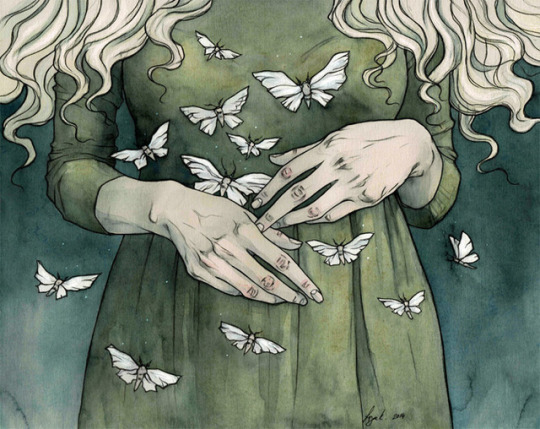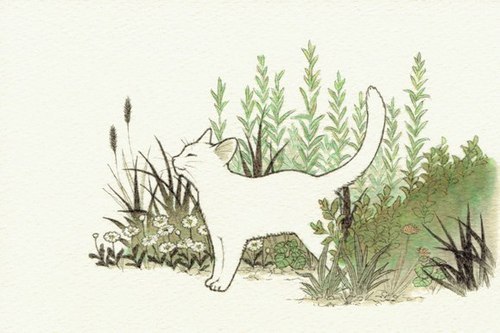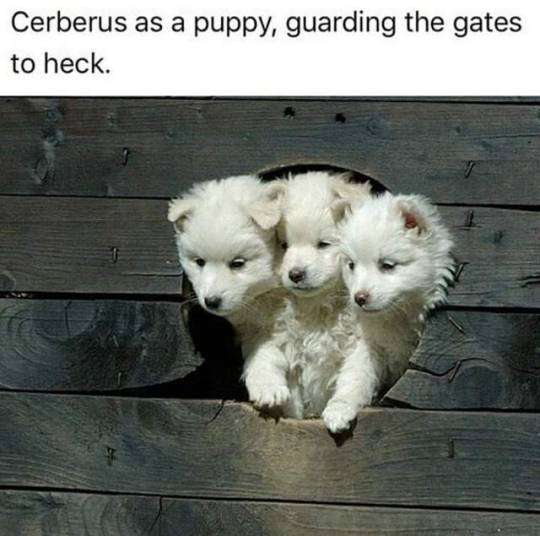Text
my parents aren’t teaching me life lessons.
#i need some adults to TEACH ME SHIT ABOUT LIFE
1M notes
·
View notes
Text
Tips for writing spells:
If you want to keep something close, bury it in your back yard.
If you want to attract something, bury it under the front door step
If you want to destroy its influence, burn it.
If you want it to move away and sink, throw it in running water
If you want to disperse it to a distance, throw it into a crossroads
If you want to fix its influence, inter it in a five-spot pattern
If you want it to work by means of spirits, bury it in a graveyard
If you want to hide its point of origin, conceal it in a tree
If you want it to work in secret, give it in food or drink
If you want it to work by stealth, hide it in clothing or on objects
If you want its influence to begin or strengthen, throw it East
If you want its influence to end or weaken, throw it West
If you want its influence to rise and fall cyclicly, float it in a tidal estuary
42K notes
·
View notes
Text

Full moon candles
One Pinch amethyst and clear quartz crystal chips.
Five drops of lemongrass and lavender esensual oil.
One pinch lavender dried flower
Light during the time of the full moon as a simple way of celebrating.
0 notes
Photo


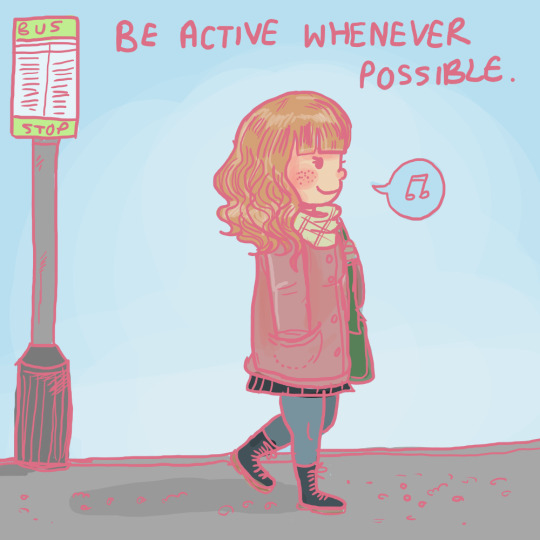
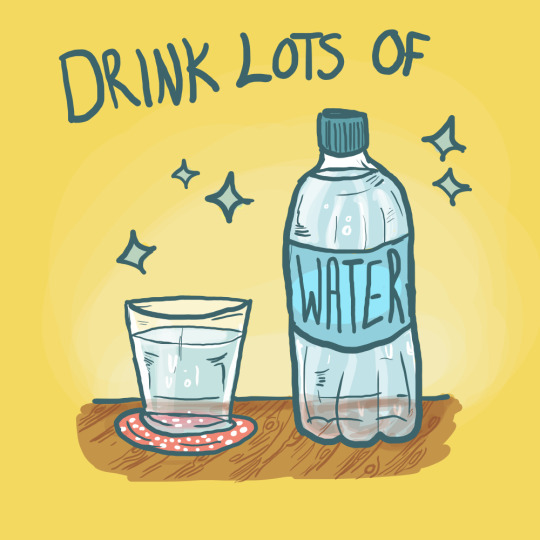
the four golden rules of a healthy lifestyle.
56K notes
·
View notes
Text
real adult™ tip from a real adult™ with executive dysfunction
do stuff while waiting for other stuff
like that sounds intuitive and vague but so much of the day is spent in a period of wait and if you struggle to motivate yourself to do things then this is the best time
waiting for your water to boil? bag up your garbage. waiting for your coffee to drip? wipe down your counters. roommate taking up the bathroom? scoop the cat box. waiting for your food to cook in the microwave? do however many dishes you can while it’s in there.
waiting is the perfect time to do a limited amount of something for yourself where you would be otherwise just standing around doing fuck-all
90K notes
·
View notes
Text
How To Be Ethereal
Drink lots if water and tea, specifically herbal teas. This will keep your skin glowy and your body hydrated.
Eat a variety of fruits and vegetables to keep your body healthy and strong
Keep your nails well kept and bare or paint them nude colors
Perform face and hair masks weekly
Have a skin care routine involving products with flowers, honey, or anything beautiful
Brush your hair and keep it clean
Exfoliate your face and body weelky for glowing skin like an angel
If you choose to wear makeup, stick with a natural look. Use highlighter and light blush to create the illusion of a slighy flushed and innocent face. Use lip gloss and nude lipsticks.
Wear perfume that isn’t too strong, but sweet and nice
Wear light clothing. If you like flowy clothing, wear that too.
Be full of light, love, positivity, and kindess
Smile often, laugh, and live life to the fullest
Dance
Listen to music that inspires you
Be in tune with your emotions
Spend time in nature
Love yourself
Cherish things that bring you joy
9K notes
·
View notes
Photo
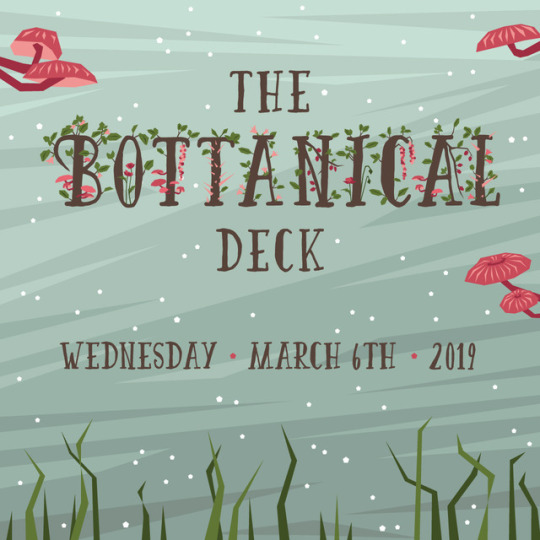
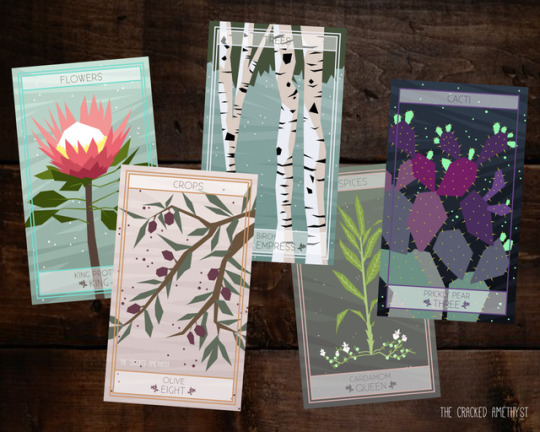
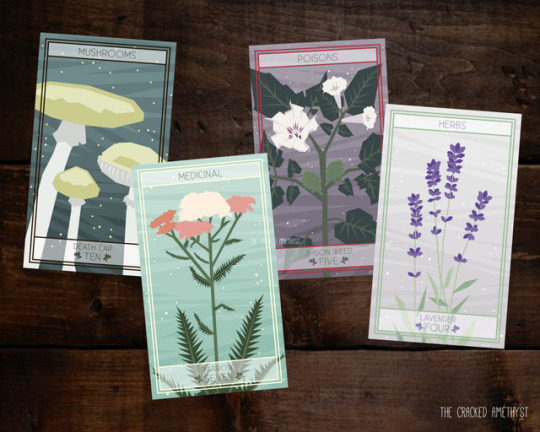
I have a date! The Kickstarter for the Bottanical Deck will go live on March 6th!
Follow me on here or Instagram (thecrackedamethyst) or sign up at my website to stay in the loop!
882 notes
·
View notes
Link
I’ve been thinking about the practicality and uses of sex magic and wanted to link to Sarah Anne Lawless’s notes on the practice, which I find useful. I think we often relegate sex magic to the shadows and refuse to acknowledge or incorporate the practice; yet, farmers and their wives in Appalachia as late as the mid-twentieth century were observed chasing one another across fields before having sex in the freshly plowed dirt to ensure a good harvest. All this to say, sex magic is folk magic and disregarding it feels like a terrible oversight.
92 notes
·
View notes
Photo
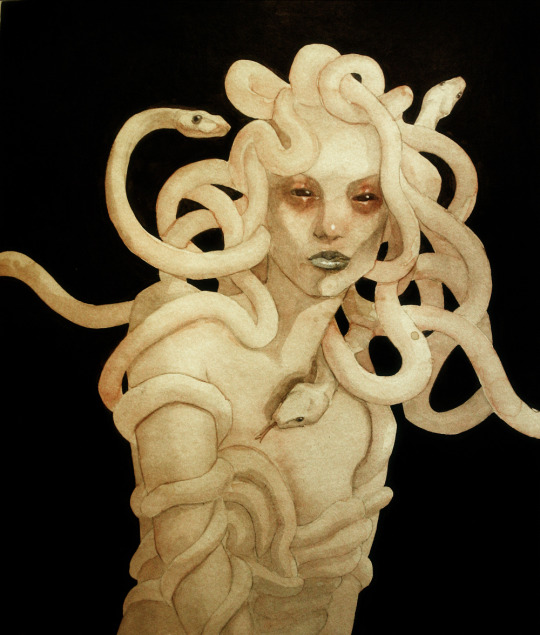
Euryale was the second eldest one of the Gorgons, three vicious sisters with brass hands, sharp fangs, and hair of living, venomous snakes. She, like her sisters, was able to turn any creature to stone with her gaze. She and her sister Stheno were immortal, but Medusa, the last of the sisters, was mortal.
13K notes
·
View notes
Text
50 Most Beautiful Words in Irish
Aimsir (AM-shir) – Weather, time, season.
This is the Irish word for an ever-popular topic with which to make small talk in Ireland. Its earlier meaning, ‘time’, occurs in a proverb which translates as ‘time is a good storyteller’.
Aisling (ASH-ling) – Vision, dream, apparition.
This word is used of a popular eighteenth-century poetic genre in which Ireland appears to the poet in a vision in the form of a woman who speaks to him of the current state of the nation. The word is now popular as a personal name.
Aoibhneas (EEV-nass) – Bliss, delight.
This word generally refers to the joy we feel from external things such as music, song, scenery and good weather, and may be contrasted with áthas (AW-hass), which is joy arising from internal considerations.
Baile (BAL-yeh) – Place, home, homestead, farmstead, village, town.
This Irish word is probably the most commonly occurring term in Irish placenames and is usually anglicized as Bally.
Bean an tí (BAN-a-TEE) – The woman of the house.
Schoolchildren who lodge with families in Irish-speaking parts of Ireland quickly learn the centrality of this person in their life. Her counterpart, fear an tí (FAR-a-TEE) ‘the man of the house’, may also be encountered. Both terms can also be used to denote ‘the master of ceremonies’ at an event.
Beatha (BA-ha) – Life, livelihood, food, sustenance.
One of the uses made of this Irish word is in salutations, such as ‘your life and your health to you’. It also occurs in a surname meaning ‘a son of life’, one variant of which has given us the anglicized form Macbeth, as found in Shakespeare.
Blas (Bloss) – Taste, flavour, accent.
This Irish word is used in a proverb that translates as ‘a small amount is tasty’, a notion perhaps better suited to a country like Ireland than the concept that ‘bigger is better’. The word can also be used of speech – one says in Irish that there is a lovely flavour on a person’s speech if their accent is good.
Bó (Boe) – Cow.
The cow has been central to Irish rural life for many centuries and the Irish word for it occurs as an element in many place and river names. Looking up at the stars, the Milky Way is called ‘The Way of the White Cow’ in Irish.
Bua (BOO-a) – Victory, talent, virtue.
One of the sayings in which this Irish word is used may be translated as ‘Bring victory and a blessing!’, in other words, ‘Best wishes!’
Cara (KA-ra) – Friend.
This Irish word occurs in the quintessential way of addressing someone at the beginning of a letter – the formula may be simply translated as ‘O friend!’
Ceol (Kyol) – Music, song, vigour.
This word conjures not only music but the conviviality that is a central element to Irish life. The idiom ‘you are my music’ essentially means ‘Bravo!’
Comhaltas (COAL-tas) – Co-fosterage, friendship, membership.
This word is used in the title of the Irish traditional musicians organization Comhaltas Ceoltóirí Éireann (COAL-tas KYOAL-tory AY-ran) ‘Association of Musicians of Ireland’, which is very often referred to, by way of a blend of the first two words, as Ceoltas (KYOAL-tas).
Comhar (Core) – Combined work, mutual assistance, partnership.
Originally meaning co-operative ploughing between neighbours, this Irish word now evokes the general notion of co-operation and shared work.
Comhluadar (CO-loo-der) – Company, family.
This Irish word primarily describes convivial company, namely people conversing pleasantly together, but may also refer to family.
Craic (Crack) – Entertaining conversation, high-spirited fun.
Although originally a borrowing from Middle English, this word has been borrowed back into the English of Ireland in its Irish-language spelling, and is felt to denote a uniquely Irish variety of boisterous fun.
Dáil (DAW-ill) – A coming together, a consultative gathering.
This word can denote a tryst or a meeting of various sorts but is best known now as the title of the principal chamber of the national parliament, Dáil Éireann (‘the Assembly of Ireland’) or simply the Dáil.
Dathúil (DA-hoo-il) – Good-looking.
This Irish word literally means ‘coloured’ or ‘colourful’, and is used to describe beauty and comeliness of appearance.
Dóchas (DOE-hass) – Hope.
This Irish word conjures a sense of trust, belief, confidence and optimism, and is used in the title of a number of Irish organizations and institutions.
Draíocht (DREE-oct) – Magic, enchantment.
This Irish word for magic once specifically denoted the secret lore and arts of the druids of pre-Christian Ireland and Celtic society.
Dúchas (DOO-hass) – Birthright, heritage, native place, innate quality.
This Irish word sums up what we are born with. One of the many proverbs in which it occurs translates as ‘instinct is stronger than upbringing’.
Éire (AY-ra) – Ireland.
The name of the country. The English form ‘Ireland’ derives from it and the poetic form ‘Erin’ is based on its dative and genitive forms Éirinn and Éireann. The land-goddess of the country had Éire as one of her names in medieval tradition, and writers represented Éire as one of three sisters, the others being Banbha (BAN-va) and Fódla (FOE-la), who also appear as personifications of the country, and are occasionally encountered in Modern Ireland in titles etc.
Fadó (Fodd-Oh) – Long ago.
This Irish word is used in a variety of phrases that can be used to begin a folktale, and corresponds to the English ‘Once upon a time’.
Feis (Fesh) – Feast, celebration.
Etymologically, this denotes the act of spending the night, especially with another person, hence ‘espousal’, and by extension was used of a festival held in honour of the marriage of a king, including symbolic marriage to the sovereignty goddess. The most famous of these in early Ireland was the feast of Tara. The word is now generally used with reference to festivals or competitions of music or dance.
Fios (Fiss) – Knowledge.
If you want to say you know something in Irish you say you have its knowledge, namely knowledge of it. If you leave out the ‘its’, the sense is ‘prophetic knowledge’. The word is used in the title of Geoffrey Keating’s monumental history of Ireland (1634), which translates as ‘A foundation of knowledge about Ireland’.
Flaithiúil or Flaithiúlach (Fla-hool, Fla-hool-ock) – Generous, princely.
This word, which is still often used in the English of Ireland, contains the element flaith ‘lord’, who in medieval times was expected to be munificent. Nowadays, generosity is not confined to the upper echelons, and it may be noted that Ireland was ranked the most generous country in Europe and fifth most generous in the world in the World Giving Index 2013.
Foinse (Fwin-sha) – Fountain, spring, source
This evocative word was used as the title of an Irishlanguage newspaper, which is currently only available online.
Gael (Gale) – An Irish person, a Scottish highlander
This word speaks to the shared heritage of Ireland and Scotland – and indeed to our more distant Celtic cousins, the Welsh, as the word itself is thought to derive from the Welsh word gwyddel ‘raider’, a sense which resonates with the fact that our patron saint, Patrick, was abducted as a slave from Britain in the fifth century.
Gaisce (GOSH-ka) Weapons, feat (of arms), bravado
This word is used as the title of the President’s Award, Ireland’s national challenge award earned by young people between 15 and 25 for participating in several activities, in which context it is best translated as ‘great achievement’.
Inis (IN-ish) – Island
No longer the common Irish word for ‘island’, this word survives mostly in names, such as Inis Fraoigh (‘Heathery Isle’, anglicized Inishfree), County Sligo, made famous by the poem ‘Lake Isle of Innisfree’ by William Butler Yeats. The word occurs also in the old appellation Inis Fáil, a poetic name for Ireland, a term that was used in a speech by US President Bill Clinton in Dublin in 1995.
Fáilte (FALL-tcha) – Welcome
This Irish word, originally meaning ‘joy, bliss, happiness’, occurs in a traditional salutation which translates as ‘a hundred thousand welcomes’.
Leannán (LAN-awn) – Lover
To say that love is blind in Irish, one says ‘a lover sees no fault’. This was one of the words used by the professional poetic class in medieval times to metaphorically describe their noble patrons.
Meitheal (MEH-hull) – Working party
This Irish word refers to the tradition of a group of neighbouring farmers coming together for a number of days to reap corn, pick potatoes, etc. No pay was involved but the recipient of the help was expected to provide hospitality.
Meas (Mass) – Estimation, opinion, esteem, respect
This Irish word is still encountered in the English of Ireland. ‘They have great meas on him’, for instance, means ‘they have great regard for him’. It is also used in a formula for signing off a letter, namely Is mise le meas (ISS-MISHa-leh-MASS), which translates as ‘It is I, with respect’, and which may be seen occasionally in the letters pages of English language newspapers in Ireland.
Misneach (MISH-nock) – Courage, spirit, hopefulness
This popular word occurs in a proverb meaning ‘The man of courage has never lost’, in other words, ‘fortune favours the brave’. The word itself seems to have the effect of adding encouragement to a conversation when introduced.
Muiceanach idir Dhá Sháile (MWICK-in-ock-idder-gaw-haw-lya) – A hog-backed hill between two arms of the sea.
This west of Ireland placename is impressive in both its original Irish form and in its anglicized dress, Muckanaghederdauhaulia, a form which appears in Georges Perec’s 1978 novel, La Vie mode d’emploi (the English translation is entitled Life, A User’s Manual), where it is visited and painted by the hero, who believes it to be the longest port name in the world.
Pléaráca (PLAY-raw-ka) – Revelry, boisterous merrymaking
This word speaks to an element of Irish culture that goes back a long time. It occurs in the title of an eighteenth-century poem which was set to music by the famous harper Turlough O’Carolan and translated by Jonathon Swift as ‘O’Rourke’s Feast’. It begins: O’Rourke’s noble fare / Will ne’er be forgot / By those who were there / And those who were not.
Plámás (Plaw-mawss) – Flattery, soft talk, cajolery
This is the art of flattery, Irish style. It may sometimes involve empty praise but it’s still nice to be on the receiving end of it.
Saoi (SEE) – Wise and learned person
Though this word is rightly reserved for the more eminent among us, a proverb reminds us that a saoi is not wont to be without fault, or, to put it another way, ‘Homer sometimes nods.’
Saoirse (SEER-sha) – Freedom, liberty
This word, which expresses a noble idea, originally referred to the privileges enjoyed by the nobility. Nowadays, it is an ideal sought after and expected by everyone and has become popular as a first name.
Scéal (Shkayle) – Story, account, narrative, tale, piece of news, state of affairs
Storytelling – scéalaíocht (SHKAYLE-ee-ockt) – is an art that has always been appreciated in Ireland. Long-windedness, however, is not, and there are several intriguing ways that describe narratives that suffer from this ailment, one example being ‘the story of the eight-legged dog’.
Sceitimíní (SKETCH-a-meeny) – Excited feelings, fits of rapturous excitement
If you are really excited in Irish, you say that these are on you!
Sláinte (SLAWN-tcha) – Health, soundness, completeness
This Irish word can be used in various ways when making a toast, one of which is simply to exclaim Sláinte!
Slán(SLAWN) – Health, soundness; healthy, safe
This Irish word can be used in various ways when saying goodbye to someone. One may simply exclaim Slán!, or Slán agus beannacht! (Slawn OGG-uss BAN-ockt), which means ‘farewell and a blessing’.
Sona (SUN-a) – Happy, lucky, fortunate
The primary sense of this word is ‘happy’ and may be used, for instance, in wishing someone a happy birthday. Its less dominant sense is found in a proverb indicating that luck is largely a matter of opportunity and may be translated as ‘the lucky man waits for the lucky moment.’
Spleodar (SPLYO-dar) – Glee, joy, vivacity, exuberance
One of the many Irish words for fun, this one seems to exude its sense and has been used for the title of a number of organizations and events.
Suaimhneas (SOO-iv-nass) – Peace, tranquillity, quietness, rest
This popular Irish word encapsulates the sense of serenity that is much striven for in modern life.
Taisce (TASH-ka) – Store, treasure, hoard
This Irish word can be used as a term of endearment, as in A thaisce! (a-HASH-ka), meaning ‘My darling!’. It is also used with the definite article, i.e. An Taisce (un-TASH-ka), as the title for the National Trust for Ireland, an NGO with a public interest mandate relating to the environment.
Taoiseach (TEE-shock) – Leader, chief, ruler, prime minister
In origin, an adjective meaning ‘first’, it came to denote a chieftain in medieval times. Nowadays, it is used exclusively as the title of the Irish prime minister.
Uachtarán (OOK-ter-awn) – President
This word contains the element meaning ‘cream’, that which rises to the top.
Uisce (ISH-ka) – Water
Something which seems to fall from the sky endlessly in Ireland. Naturally, it has captured the Irish imagination. Its flowing underground has given rise to a metaphorical term for ‘intrigue’. Uisce beatha, ‘the water of life’, was originally anglicized to usquebaugh and variants thereof, and later shortened to ‘whiskey’.
[source: smartling.com]
2K notes
·
View notes
Text
odin is like “when thor was born the sun shone bright upon his beautiful face. i found loki on the sidewalk outside a taco bell”
415K notes
·
View notes
Text
Finding time for Witchcraft
Sometimes it’s hard to make room for magic in daily life. We understand, so we made this hypothetical schedule to give you an idea of how to incorporate a little magic every hour of your day.
6:00 am Charge your morning tea or coffee while checking the moon phase
7:00 am Pick out a talisman to wear for protection/luck/etc. when dressing
8:00 am Use a sigil or glamour perfume to enhance confidence for the day
9:00 am Use a protective charm for traveling on your way to work or class
10:00 am Use an attraction charm or friendly glamour to improve interactions
11:00 am Drink plenty of fruit or crystal infused water for magical hydration
12:00 pm Add charged spices to your lunch for midday energy re-boost
1:00 pm Spend a moment with enchanted smelling salts for calmness
2:00 pm Cast a simple spell using emojis on your smartphone
3:00 pm Give a cup of coffee with enchanted sugar to ‘sweeten’ someone up
4:00 pm Use a concentration sigil to improve your work or studying
5:00 pm Use a money or luck spell for payday, or to beat traffic home
6:00 pm Choose specific ingredients for your intent when making dinner
7:00 pm Cleanse your home with herbs, or a crystal-infused room spray
8:00 pm Set aside some time to light some candles and meditate
9:00 pm Remove the day’s energy with an herbal soap in the bath or shower
10:00 pm Use a dream pillow or cast a sleep circle for the perfect night’s rest
There’s always time for magic!
25K notes
·
View notes
Text
If you can cook, you can do witchcraft!
113 notes
·
View notes
Photo

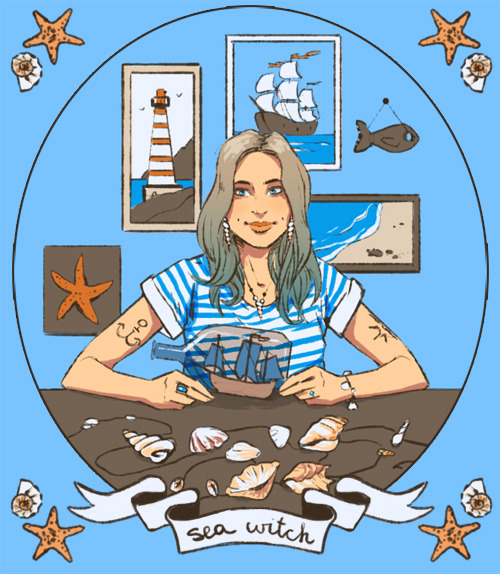

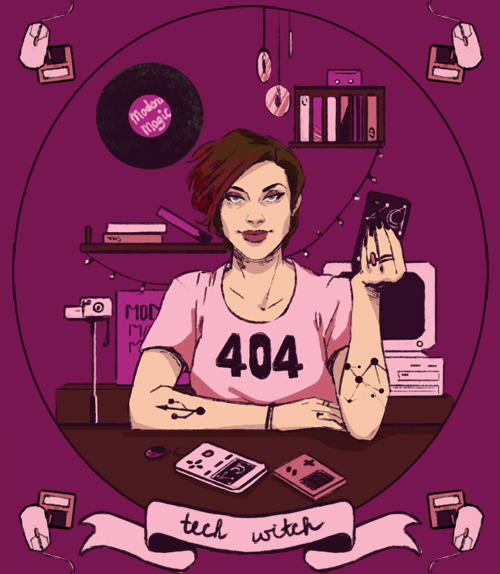

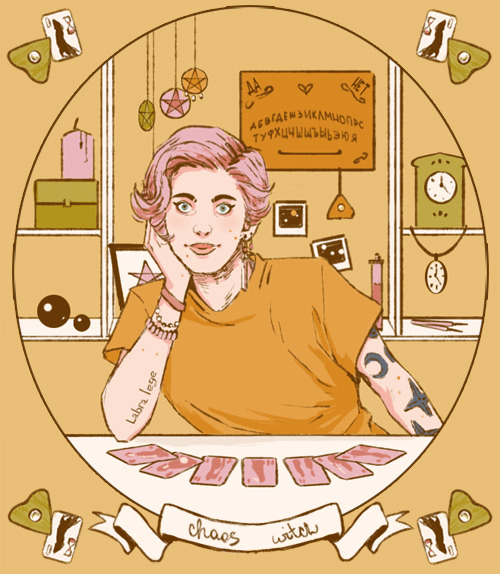
more witch types in my instagram
15K notes
·
View notes
